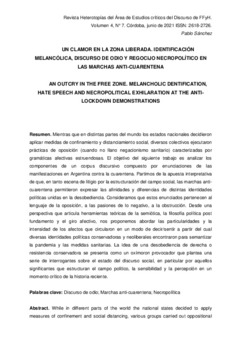Un clamor en la zona liberada: identificación melancólica, discurso de odio y regocijo necropolítico en las marchas anti-cuarentena
An outcry in the free zone: melancholic dentification, hate speech and necropolitical exhilaration at the antilockdown demonstrations
| dc.creator | Sánchez Ceci, Pablo Daniel | |
| dc.date.accessioned | 2021-11-11T16:38:59Z | |
| dc.date.available | 2021-11-11T16:38:59Z | |
| dc.date.issued | 2021-06-30 | |
| dc.identifier.citation | Sánchez Ceci, Pablo Daniel; Un clamor en la zona liberada: Identificación melancólica, discurso de odio y regocijo necropolítico en las marchas anti-cuarentena; Universidad Nacional de Córdoba. Facultad de Filosofía y Humanidades; Heterotopías; 4; 7; 30-6-2021; 1-21 | es |
| dc.identifier.issn | 2618-2726 | |
| dc.identifier.uri | http://hdl.handle.net/11086/21437 | |
| dc.identifier.uri | https://ri.conicet.gov.ar/handle/11336/138472 | |
| dc.description.abstract | Mientras que en distintas partes del mundo los estados nacionales decidieron aplicar medidas de confinamiento y distanciamiento social diversos colectivos ejecutaron prácticas de oposición (cuando no llano negacionismo sanitario) caracterizadas por gramáticas afectivas estruendosas. El objetivo del siguiente trabajo es analizar los componentes de un corpus discursivo compuesto por enunciaciones de las manifestaciones en Argentina contra la cuarentena. Partimos de la apuesta interpretativa de que, en tanto escena de litigio por la estructuración del campo social, las marchas anti- cuarentena permitieron expresar las afinidades y diferencias de distintas identidades políticas unidas en la desobediencia. Consideramos que estos enunciados pertenecen al lenguaje de la oposición, a las pasiones de lo negativo, a la obstrucción. Desde una perspectiva que articula herramientas teóricas de la semiótica, la filosofía política post fundamento y el giro afectivo, nos proponemos abordar las particularidades y la intensidad de los afectos que circularon en un modo de decir/sentir a partir del cual diversas identidades políticas conservadoras y neoliberales encontraron para semantizar la pandemia y las medidas sanitarias. La idea de una desobediencia de derecha o resistencia conservadora se presenta como un oxímoron provocador que plantea una serie de interrogantes sobre el estado del discurso social, en particular por aquellos significantes que estructuran el campo político, la sensibilidad y la percepción en un momento crítico de la historia reciente. | |
| dc.description.abstract | While in different parts of the world the national states decided to apply measures of confinement and social distancing, various groups carried out oppositional practices (when not plain sanitary denial) characterized by noisy affective grammars. The objective of the following work is to analyze the components of a discursive corpus made up of statements of the demonstrations in Argentina against quarantine. We start from the interpretive bet that, as a scene of litigation for the structuring of the social field, the antiquarantine marches allowed to express the affinities and differences of different political identities united in disobedience. We consider that these statements belong to the language of the opposition, to the passions of the negative, to the obstruction. From a perspective that articulates theoretical tools of semiotics, post-foundation political philosophy and the affective turn, we propose to address the particularities and intensity of the affects that circulated in a way of saying/feeling from which various conservative and political identities neoliberals found to semantize the pandemic and sanitary measures. The idea of a right-wing disobedience or conservative resistance is presented as a provocative oxymoron that raises a series of questions about the state of social discourse, in particular about those signifiers that structure the political field, sensibility and perception at a critical moment in recent history. | |
| dc.language | spa | |
| dc.publisher | Universidad Nacional de Córdoba. Facultad de Filosofía y Humanidades | |
| dc.relation | info:eu-repo/semantics/altIdentifier/url/https://revistas.unc.edu.ar/index.php/heterotopias/article/view/33537 | |
| dc.rights | Attribution-NonCommercial-NoDerivatives 4.0 Internacional | |
| dc.rights.uri | http://creativecommons.org/licenses/by-nc-nd/4.0/ | |
| dc.subject | Discurso de odio | |
| dc.subject | Marchas anti-cuarentena | |
| dc.subject | Necropolítica | |
| dc.subject | Identificación melancólica | |
| dc.subject | COVID-19 | |
| dc.subject | Comunicación y Medios | |
| dc.subject | Ciencias Sociales | |
| dc.title | Un clamor en la zona liberada: identificación melancólica, discurso de odio y regocijo necropolítico en las marchas anti-cuarentena | |
| dc.title | An outcry in the free zone: melancholic dentification, hate speech and necropolitical exhilaration at the antilockdown demonstrations | |
| dc.type | article | |
| dc.description.fil | Fil: Sánchez Ceci, Pablo Daniel. Universidad Nacional de Córdoba. Facultad de Ciencias de la Comunicación. Instituto de Estudios en Comunicación, Expresión y Tecnologías; Argentina. | es |
| dc.description.fil | Fil: Sánchez Ceci, Pablo Daniel. Consejo Nacional de Investigaciones Científicas y Técnicas. Centro Científico Tecnológico Córdoba. Instituto de Estudios en Comunicación, Expresión y Tecnologías; Argentina. | es |





